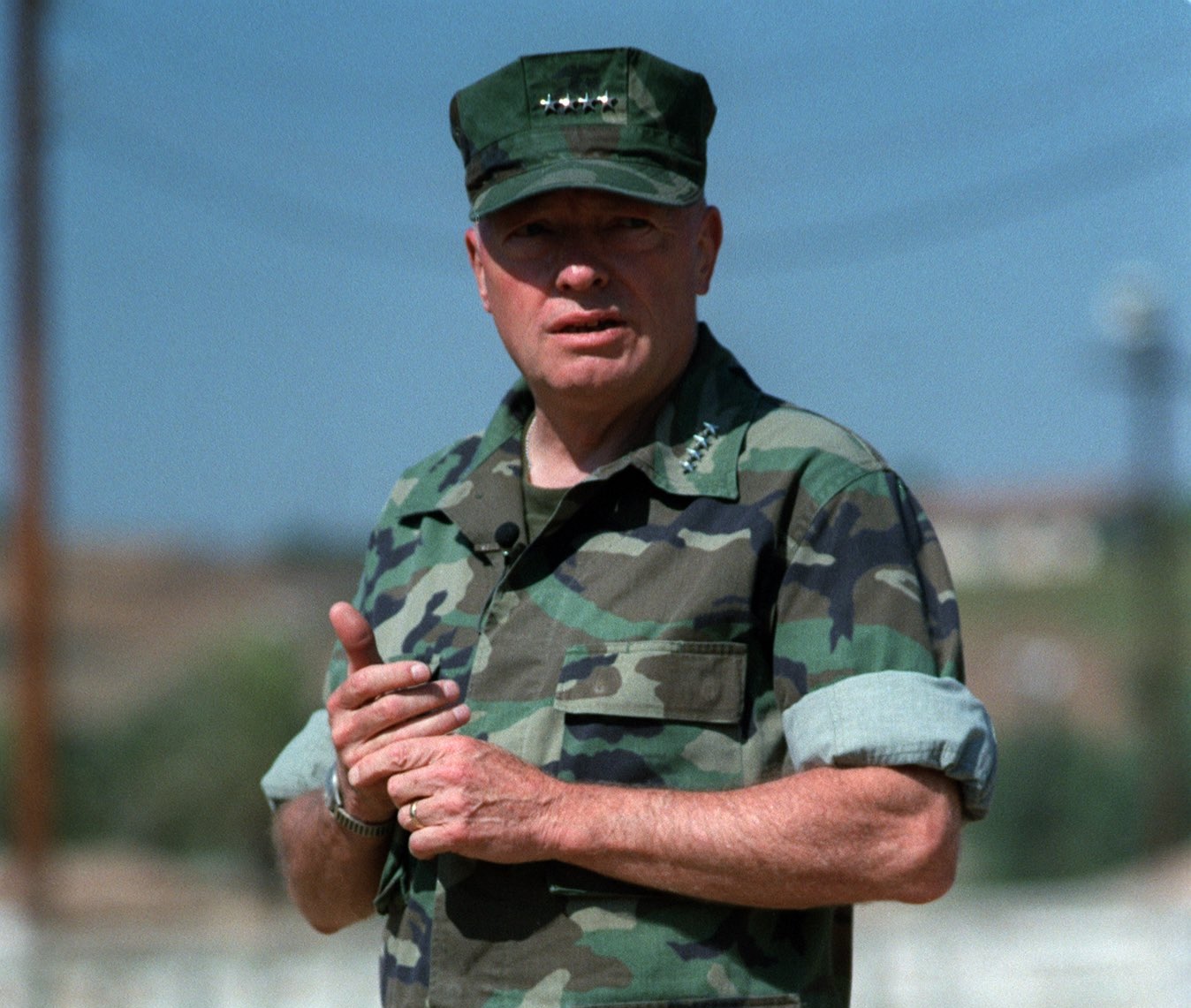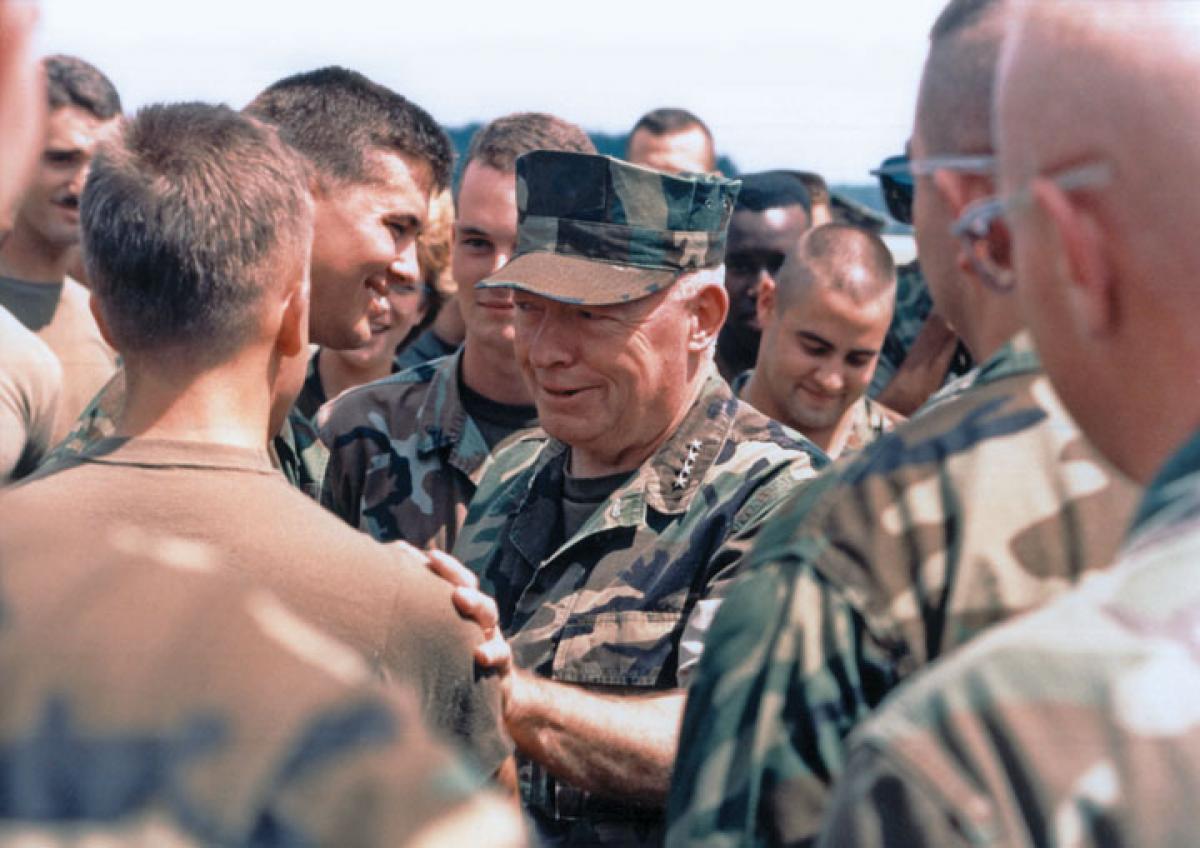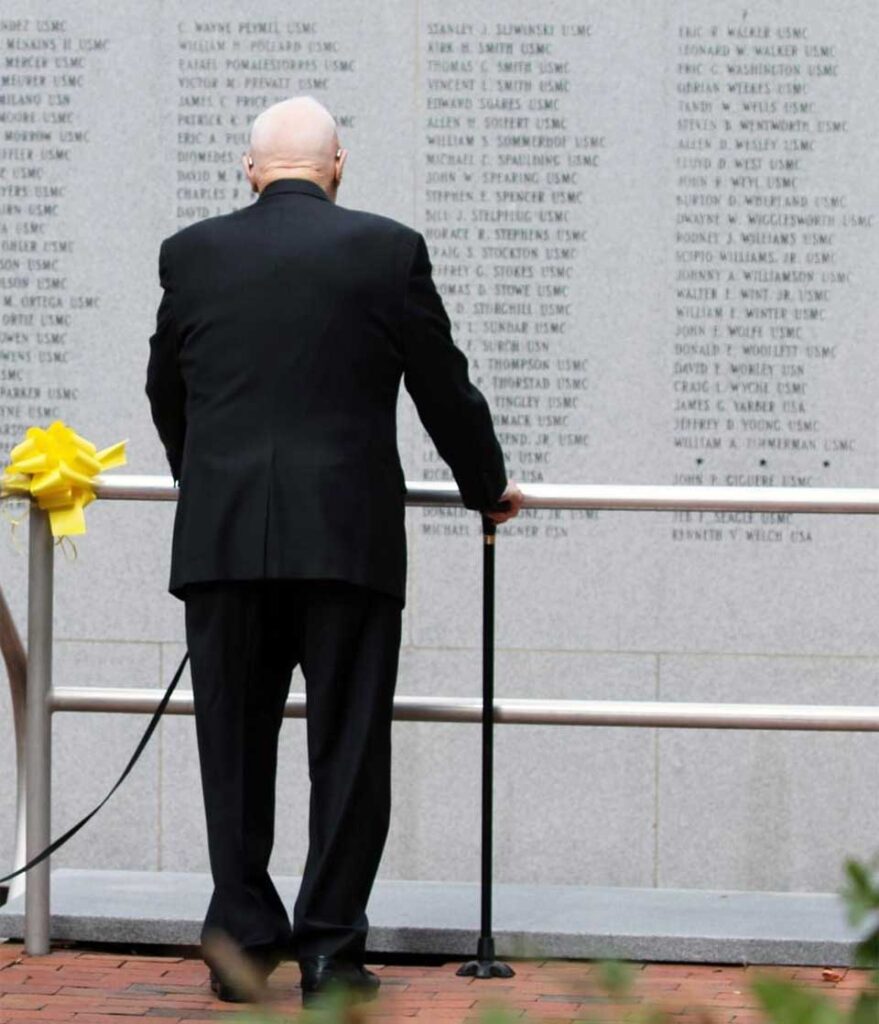
Retired Gen. Alfred M. Gray Jr., a former sergeant and Vietnam combat veteran who became the 29th commandant of the Marine Corps, passed away early Wednesday, the service announced. He was 95.
“Today I mourn with all Marines, past and present, the loss of our 29th Commandant, Gen. Gray,” Gen. Eric Smith, 39th Commandant of the Marine Corps, said in a statement. “He was a ‘Marine’s Marine’ – a giant who walked among us during his career and after, remaining one of the Corps’ dearest friends and advocates even into his twilight.”
“His contributions are many, including the development of our maneuver warfare doctrine, Warfighting, which remains, to this day, the philosophic bedrock of how we fight as Marines, Smith added.”
The retired commandant spent 41 years in uniform and led the service as its top officer from 1987 to 1991. In the decades after his retirement, he remained active in Marine Corps issues and causes. He lived with his wife Jan until she died in 2020.
“Al Gray was one of a kind … a thinker, an innovator, a teacher,” retired Gen. Robert Neller, who served as the 37th Commandant from 2015 to 2019, told USNI News. “He single-handedly made the Corps focus on warfighting from the tactical to the strategic. At the same time, he never forgot where he came from as an enlisted Marine. We all just loved him and will miss him dearly.”
After retirement, Gray remained a “Marine’s Marine,” relating personally to lance corporals and former sergeants as much as retired general officers, retired Lt. Gen. George Flynn, a long-time friend and associate who served for two years as Gray’s aide and speechwriter, told USNI News on Wednesday.
“Every Marine loved him …Marines are still sending him things to autograph,” Flynn said. “When you say ‘Al Gray’ [Marines] say, ‘I know who he is.’ Even the youngsters.”

Born June 22, 1928 in Point Pleasant Beach, N.J., Gray enlisted in the Marine Corps in 1950 and served overseas with the Amphibious Reconnaissance Platoon, Fleet Marine Force Pacific, attaining the rank of sergeant, according to his official biography. He was commissioned as a second lieutenant on April 9, 1952 and joined the 1st Marine Division in Korea, where he served as an artillery officer and then infantry officer.
In 1965, he arrived in Vietnam and was awarded the Silver Star medal for his actions on May 14, 1967, when three Marines inadvertently wandered into a minefield. A Marine detonated a mine that killed him and wounded another. Gray, then a major in command of a composite artillery battalion with 12th Marines, 3rd Marine Division, and another Marine “probed a cleared path forty meters through the unmarked minefield to the side of the wounded men,” according to the award citation.
“Directing his companion to guide stretcher barriers along the cleared route, Maj. Gray moved one of the casualties away from a sensitized mine and began administering first aid to the injured Marines,” the citation says. He then directed their evacuation out of the minefield and made his way to the mortally wounded Marine.
Gray, as a two-star general officer, was in command of the 2nd Marine Division on Oct. 23, 1983, in Lebanon when a suicide bomber attacked a barracks and killed 220 Marines, 18 sailors and three soldiers who were on a peacekeeping mission.
After his 1991 retirement, he remained connected to Marines through his work with various corporate and non-profit boards, museums and veterans organizations, and attended reunions and commemorations, like for the 1983 Beirut bombing.
After his retirement, he made an annual trip to the memorial in Jacksonville, N.C. for those killed.
“Gen. Gray’s attendance each year was important to the survivors and families of Marines lost in 1983 in the Beirut bombing,” said Ashley Danielson, vice president of development for the Carolina Museum of the Marine in Jacksonville, N.C. “His custom after the service was to spend time alone with each name on the wall. The crowd always stepped back with respect and in remembrance.”
Gray oversaw the development and 1989 publication of Fleet Marine Force Manual 1, Warfighting. The 100-page document – then-Commandant Gen. Charles Krulak revised it as Marine Corps Doctrinal Publication 1 “Warfighting” in 1997 – “remains the foundation for how the Marine Corps thinks about, prepares for, and executes all Marine Corps operations,” the service said on Wednesday.
It also was Gray who coined the phrase “every Marine a rifleman.” It’s actually a shortened version of what he said: “Every Marine is, first and foremost, a rifleman. All other conditions are secondary,” according to the service.
That spotlight and emphasis on what it means to be a rifleman, and the rifleman’s role in the service, informed Gray’s vision after he became commandant.
Gray was nominated as the service’s commandant by then-Navy Secretary James Webb, a Marine combat veteran from Vietnam. He took the helm of a service grappling with the impending fall of the Soviet Union, but he saw change as necessary for the Marine Corps to remain relevant.

Flynn, who also served as the deputy commandant for combat development and integration and head of the Marine Corps Combat Development Command in Quantico, said that Gray, “helped forge a new direction for the Corps, and he got people onboard to do it.”
“We’ve always had to keep an eye on that threat of the most likely conflicts in the mid-to low-intensity range. In today’s situation we have to be prepared for the entire range of conflict, and make sure that we’re still credible within NATO or in any situation in the Pacific. That has to involve a total-force effort, including the Marine Corps Reserve,” Gray said in a 1990 interview with Proceedings.
“We need to take our active forces and lean forward in the mid- and low-intensity parts of the spectrum. Expeditionary as we are, we must be light enough to go where we have to, and heavy enough to win once we get there.”
Gray was an early advocate for the MV-22 Osprey, which he saw as helping close an important gap in the existing fleet of helicopters.
“The total over-the-horizon concept—where you could be 1,000 miles at sea one night and come over the beaches and into the landing zones and sites of your choice the next morning, anywhere from New England to Florida—that’s the kind of flexibility and the kind of usefulness and initiative that we will need at our disposal in facing the threats of the future,” he told Proceedings.
Gray was featured in a CBS “60 Minutes” segment by correspondent Morley Safer, who traveled with Gray as he visited several Carolina bases early in his tenure, before the 1990-1991 Iraq War. A snippet of that report captured the gist of Gray’s broader campaign to restore the Corps to a warfighting foundation.
“When was the last time you were in the field?” Gray asked one mustachioed lance corporal in the piece. “Um, it’s been quite a while, sir,” came the reply. “How long?” the general asked. “Um, since boot camp, sir.” “How long have you been out of boot camp?” Gray asked. “Two years,” the Marine said. Gray didn’t hide his disappointment.
“Do you think it’s tough to be a Marine?” he asked a group of Marines gathered inside a base mess hall. “I’m going to make it harder.”
Gray was known for his down-to-earth approachability, and he was comfortable talking with Marines and greeting them with shoulder punches and slaps that endeared many to him.
“I can’t say enough about him. He was a kind man,” he added. “I would say the three loves of his life were Jan, his wife; the Corps; and his dogs.”
Gray’s canine companions over the years included black Labrador retrievers, teacup poodles, standard poodles and a Portuguese water dog named Thunder, “who was absolutely hilarious,” Flynn said.
No English bulldogs like the Corps’ official mascot, however. His dogs were fixtures while he was commandant and would join him sometimes at the Potomac Institute for Policy Studies in Quantico, Flynn recalled. One time, Gray attended a Mess Night at The Basic School where the graduating lieutenants gave him a black lab named Delta after Delta Company.
“Right now, his present dog is a Labradoodle, and his name is Lance. That’s short for lance corporal,” Flynn said.





